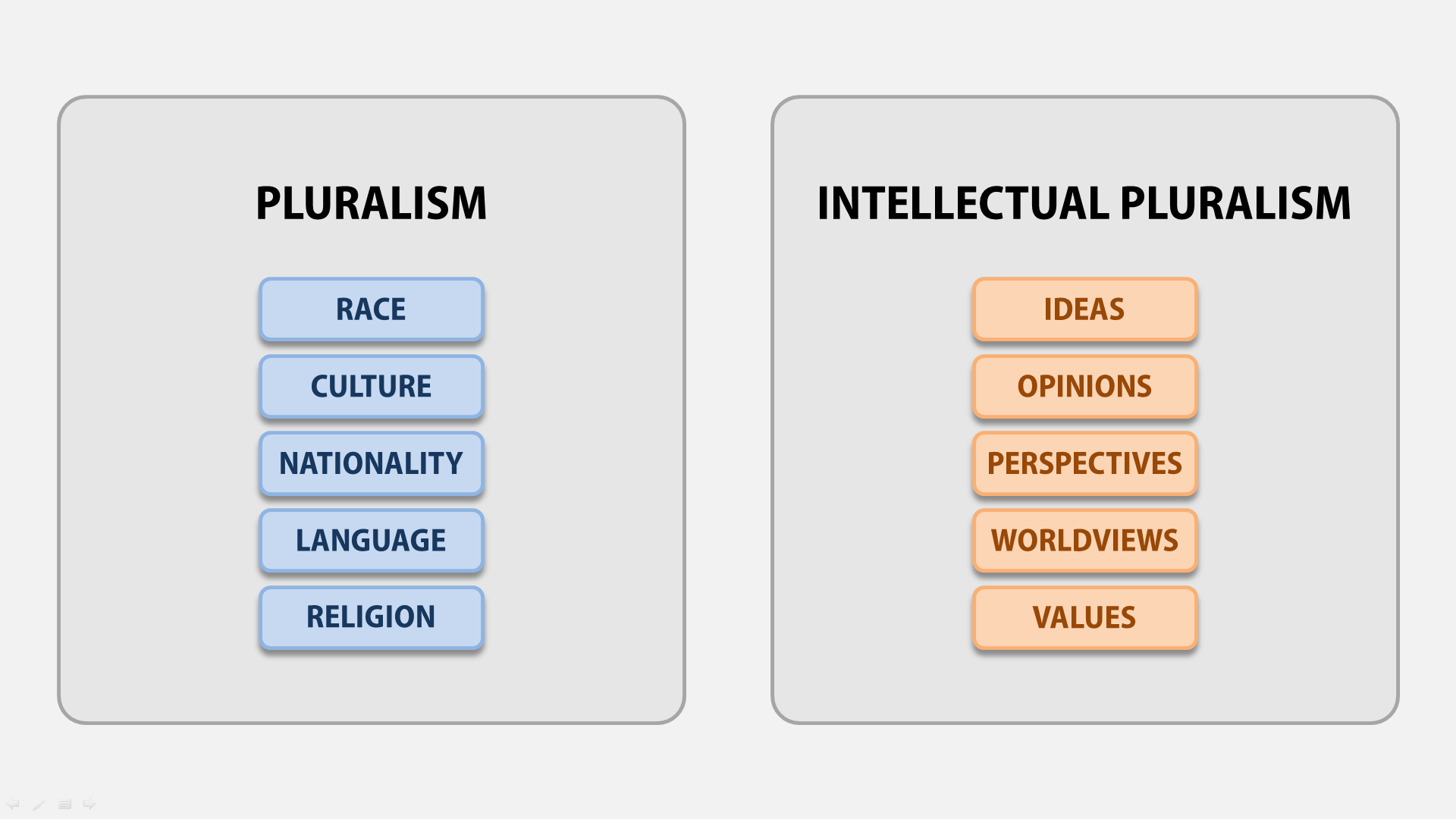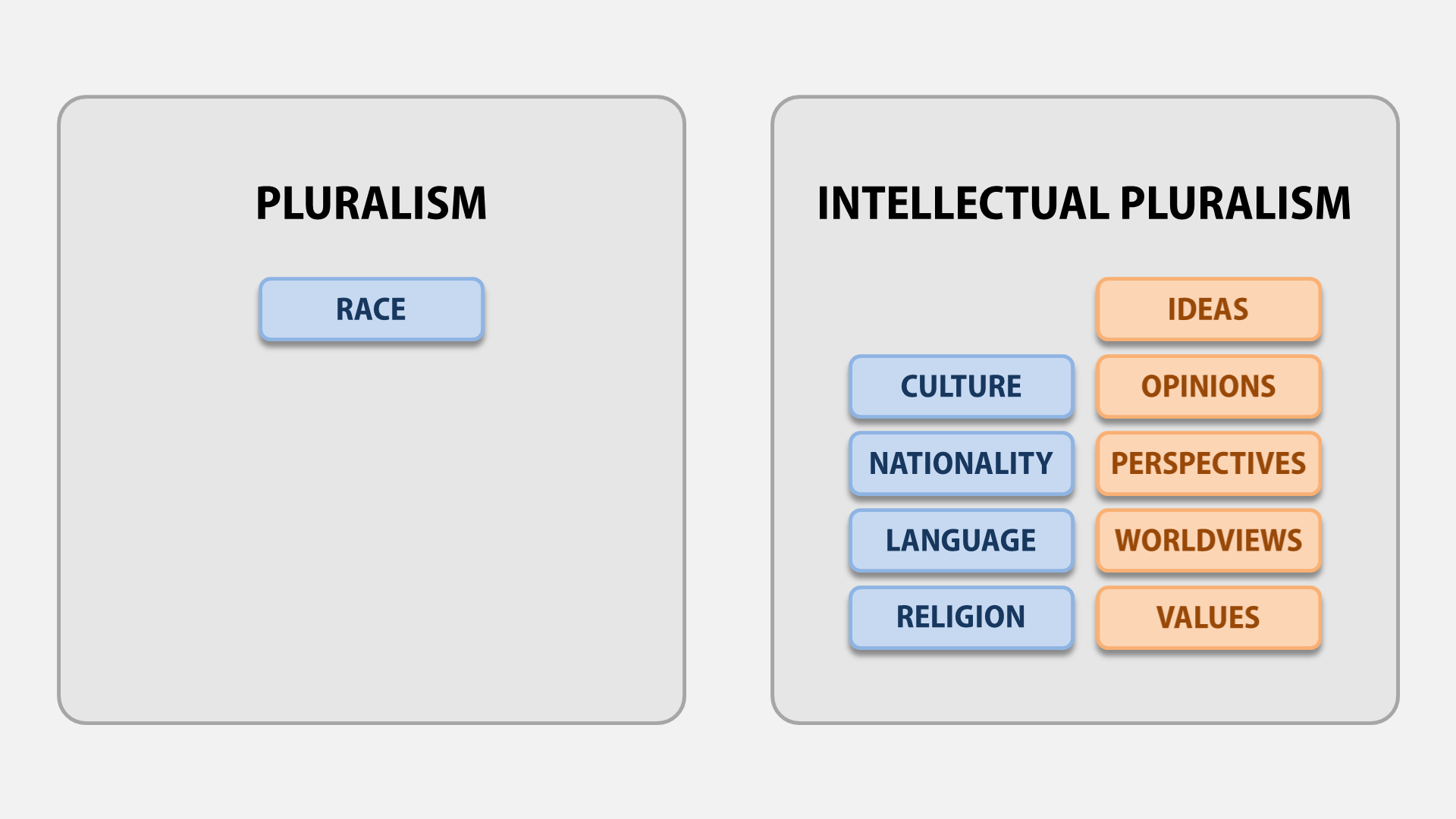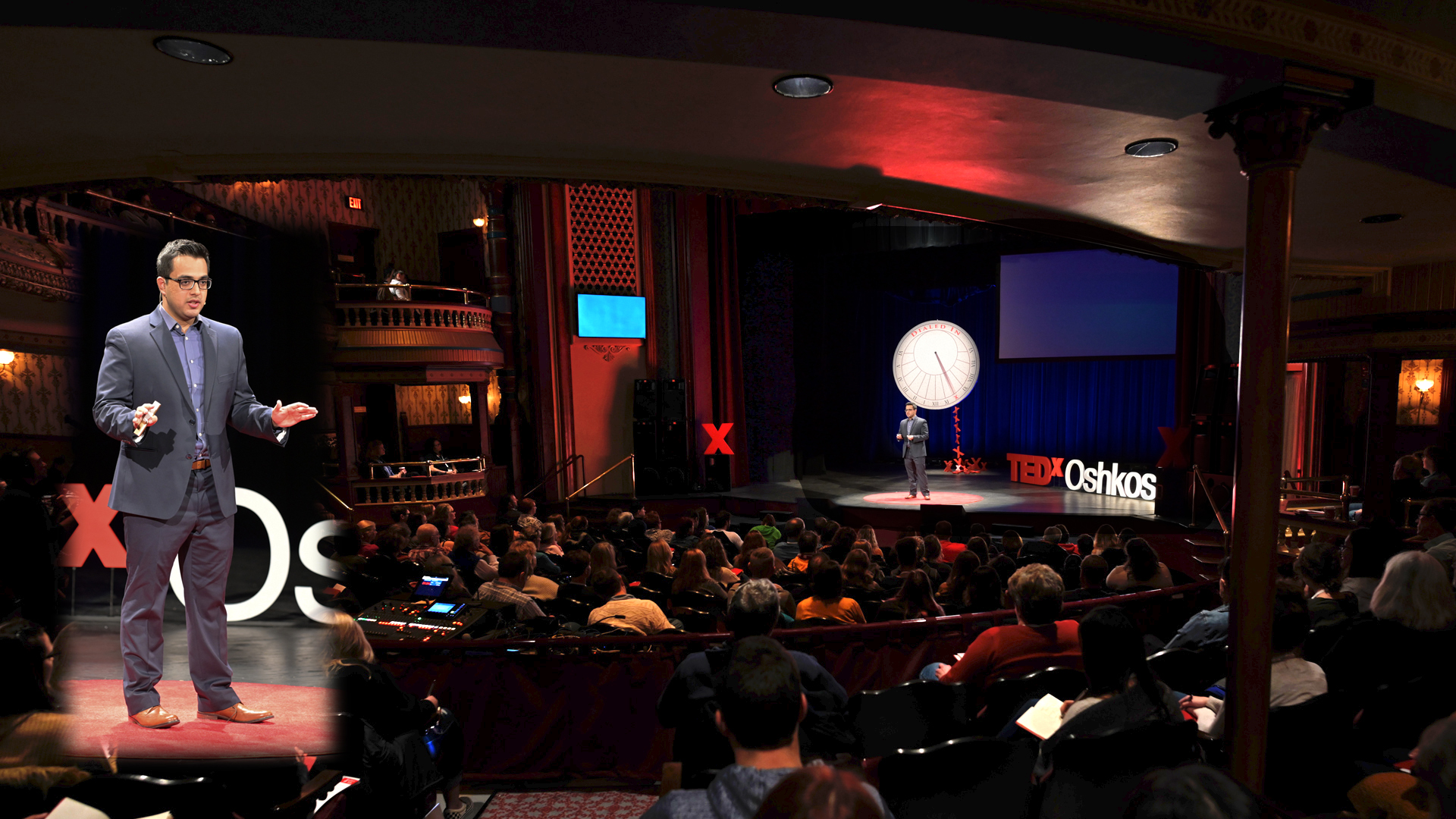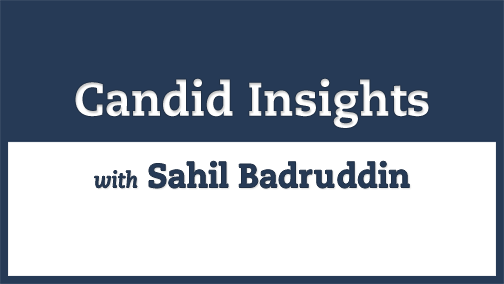TEDx Talk — Disagreement: An Essential Part of Pluralism
In his TEDx Talk, Sahil expands the Golden Rule to the way we treat and really respect other people’s ideas. He also explains that intellectual diversity means disagreement. Without difference, intellectual diversity or pluralism is impossible. In other words, if we already all agree, there can’t be any intellectual diversity.
I am honoured that Karen Armstrong’s Charter for Compassion has featured my full TEDx talk on their website. The Charter for Compassion project was launched by Ms. Armstrong when she awarded the 2008 TED Prize and, as of January 2019, has over 2 million signatories. My thanks to Mohib Ebrahim for floating this topic by me and helping refine the concepts. — Sahil Badruddin.
3 Minute Teaser
Full Talk
Full Transcript
How many of you have been ignored, dismissed or not taken seriously when you presented an idea, made a suggestion, or gave some opinion perhaps in a meeting, or with family and friends?
How did it make you feel?
Have you ever done the same when a friend, colleague, or family member offered their idea, suggestion or opinion and you ignored or dismissed it, perhaps even without really trying to understand their idea?
We all have, at some point, haven’t we?
A few months ago, I had the good fortune and privilege to interview Karen Armstrong, the internationally acclaimed scholar and winner of the 2008 TED Prize. During the interview, what struck me was her emphasis on the Golden Rule.
We all know the Golden Rule — which Armstrong explains comes in two flavors: the positive “always to treat others as you wish to be treated yourself” or the negative “never impose on others what you yourself do not desire.”
We all know the Golden Rule — which Armstrong explains comes in two flavors: the positive “always to treat others as you wish to be treated yourself” and the negative “never impose on others what you yourself do not desire.”
But, generally, we think of the Golden Rule as how we physically treat and behave with someone. What I want to do is consider how to apply the Golden Rule when it comes to the way we treat other people’s ideas. In other words, treating other people’s ideas as you wish they would treat your ideas.
So, how do we treat other people’s ideas when they are different from our own? Do we treat them with the respect they deserve, or do we sometimes belittle or mock them?
But, generally, we think of the Golden Rule as how we physically treat and behave with someone. What I want to do is consider how to apply the Golden Rule when it comes to the way we treat other people’s ideas. In other words, treating other people’s ideas as you wish they would treat your ideas.
A new perspective on what real “respect” looks like
But before I get into how the Golden Rule applies to respecting people’s ideas, I want to first talk a little bit about the word “respect” and what it really means because it’s a nice, warm and fuzzy platitude that’s bandied about a lot these days but, I think, without really understanding what it means at a practical level.
I want to first talk a little bit about the word “respect” and what it really means because it’s a nice, warm and fuzzy platitude that’s bandied about a lot these days but, I think, without really understanding what it means …
We all know that we should treat other people’s differences — like race (i.e. skin color), culture, language, or nationality — with respect. That is, differences people are born with or into and have no control over. This is generally called pluralism.
But what about our ideas? Even though we’re not born with them, we all have different ideas, opinions, perspectives, worldviews, or values and these differences should also be respected. This too is pluralism, “intellectual pluralism.”

But why are we told to respect different races (i.e. skin colors), but are, generally, never told to respect, say, different eye colors or hair colors? We’re born with both, aren’t we? In other words, what’s special about skin color that we’re supposed to “respect” but not eye or hair color? Why is eye color or hair color not even on our radar? Is it because race, indirectly suggests a different culture, and people fear cultures different from their own? Or is it because some just cannot simply accept people of different races (white, brown, black, etc.)?
Why would we treat people differently based on something they are born with and have no control over? Again, if our eye or hair color is not a problem, why is the color of our skin?
So back to respecting these differences. What, exactly does this even mean?
I think we can only truly respect a difference when we hold the other race, religion or culture as equally valid and legitimate to our own. From this view, respect really means that no race, religion or culture is elevated above another as superior…. I would argue, is how we really respect our differences.
I think we can only truly respect a difference when we hold the other race, religion or culture as equally valid and legitimate to our own. From this view, respect really means that no race, religion or culture is elevated above another as superior.
Now if we think about it, isn’t that the Golden Rule?
“We don’t want others to treat their race, religion or culture as better than ours, so we don’t treat ours better than theirs.” And this, I would argue, is how we really respect our differences.
So, when I talk about respect, as it applies to Pluralism, all I’m really talking about is how to apply the Golden Rule.
Respect meets intellectual pluralism
But you might be wondering what does this all have to do with intellectual pluralism and its domain of ideas, opinions, perspectives, worldviews, and even values? The answer is everything.
We often think letting someone speak and hearing them out is respect. But if we’re not sincerely interested in changing our position based on what we hear, then it’s not really respect.
We often think letting someone speak, and hearing them out, is respect. But if we’re not sincerely interested in changing our position, based on what we hear, then it’s not really respect. All we’re doing is being polite and humoring the person because, actually, we’ve already decided our position is more valid, legitimate, or correct than theirs even before they’ve said anything.
So I’m suggesting let’s apply this notion of respect — or really the Golden Rule — to ideas, opinions, perspectives and the whole intellectual space in a practical and sensible way.
If, when I talk about respecting the items shown in the left box, I mean no race, religion, culture is better or superior than another, then when it comes to respecting intellectual matters shown in to the right box, it simply means no idea, opinion, perspective, or worldview should be assumed defacto to be superior than another. After all, reasonable minds can differ.
If, when I talk about respect, I mean no race, religion, culture is better or superior than another, then when it comes to respecting intellectual matters, it simply means no idea, opinion, perspective, or worldview should be assumed defacto to be superior than another. After all, reasonable minds can differ.
Now just to be clear, and so there’s no misunderstanding, there will always be fringe elements of society which advocate opinions and ideas that would negatively disrupt the social fabric. Notions such as bigotry or discrimination. The equality and respect between ideas and opinions, I’m advocating for, of course, does not apply to these socially irresponsible opinions and ideas.
However, there are, times when it is necessary to disrupt the social fabric, but in a positive way. Ghandi, Martin Luther King, the struggle for women’s rights, among other examples, all impacted the social fabrics of their times. But, these movements improved the human condition and promoted human dignity because all they really did was move society forward by shaking things up in a positive way, rather than negatively disrupting society.
Then there are other fringe elements of society which hold opinions — for example, like the world is flat — which are contrary to objective, established facts, but which generally don’t disrupt the social fabric. These fringe opinions are also not obviously valid or equal to established facts, but, we do respect the right of the individual to hold their own opinions.
So rather than try and seek some idealistic, utopian principle for intellectual pluralism, that is universal and does not need any exceptions, let’s not get hung up on the fringe, and not let exceptions drive the rule for the majority. Let’s not use fringe examples as an excuse to avoid engaging constructively with the 95%, maybe even 99%, of the rest of society’s valid, legitimate and differing perspectives on various issues.
Let’s not use fringe examples as an excuse to avoid engaging constructively with the 95%, maybe even 99%, of the rest of society’s valid, legitimate and differing perspectives on various issues.
Let’s not throw out applying the Golden Rule to ideas — or if you will, applying intellectual pluralism — just because there are a few fringe exceptions.
But we have a problem!
Intellectual pluralism is the elephant in the room
If you look at my diagram, I said the left box were things we are born with. But in general, we’re born into — not with — a culture, religion, language and we can actually, to some extent, change these. They’re not locked in like race.
So I’m going to fix my diagram and move these over to the other box.

If we think about it, culture, nationality, language and religion are really intellectual products created by a group of people and, over time, accepted as the norm by those people. They are, in other words, just proxies for a collection of ideas, opinions, values and perspectives.
Because, if we think about it, culture, nationality, language and religion are really intellectual products created by a group of people and, over time, accepted as the norm by those people. They are, in other words, just proxies for a collection of ideas, opinions, values and perspectives.
Now, something interesting just happened!
I would say pluralism is concerned with two broad categories of differences. On the one hand, there are natural differences (those we are born with and have no control over) in the left box.
And then on the other hand, there are differences that arise from some kind of human intellectual effort (the right box). Notice how almost everything important, everything that makes us human — culture, religion, worldviews, values, ideas, opinions, perspectives — are all in the right box.
Notice how almost everything important, everything that makes us human — culture, religion, worldviews, values, ideas, opinions, perspectives — are all in the right box. It almost seems like respect for differences is really all about respecting intellectual differences.
It almost seems like respect for differences is really all about respecting intellectual differences. Because again, because if I think about it, one of the only natural differences that has caused any kind of wars or major conflict is skin color. I don’t recall wars being fought over people’s eye or hair color.
On the other hand, no end of wars and conflict have occurred due to culture, nationality, values, ideas, opinions, or perspectives.
Now if we only truly respect intellectual differences when we make them equal, and don’t elevate our ideas or perspective as superior or above others, then there’s a catch.
Intellectual humility is a prerequisite to intellectual pluralism
It means we have to accept they may be right, and we may be wrong — or of course we both may be wrong. Or, in subjective issues with nuanced situations, we both may be right for different reasons because, in those cases, there isn’t a right or wrong answer. Take some laws, for example. These change over time or differ between countries so don’t even have an objective, factual end result. Subjective matters, by definition, will never have a final answer but only a panoply of various perspectives.
But I’ll be the first to admit, this is not easy. It’s not easy to admit we could be wrong about something. We all want to believe our ideas, opinions, perspectives, and theories are better than someone else’s.
I would say each one of us has a unique perspective or opinion on something that differs from others in this room. So now what are we going to do about it? How are we going to frame these differences? Are we going to let our egos carry the day?
Look around you. Do you think you have ideas, opinions, views and perspectives that differ from anyone else in this room? I would say each one of us has a unique perspective or opinion on something that differs from others in this room. So now what are we going to do about it? How are we going to frame these differences? Are we going to let our egos carry the day?
I would argue the real test of a truly mature and intellectually pluralistic mindset is one that is able to genuinely and humbly engage with other views — or as Oscar Wilde said “playing gracefully with ideas” — because, more often than not, progress has come from socially responsible, divergent views, views we will often disagree with.
Wanted: More disagreement!
Disagreement is an inevitable part of the human condition but is often conflated with conflict. Society has equated peace and progress to the absence of conflict, or more precisely, suppressing or avoiding disagreement. But disagreement is simply an innate aspect of thinking. Without difference, intellectual diversity or pluralism is impossible. Intellectual diversity means disagreement. In other words, if we already all agree, there is no diversity. More disagreement means more intellectual diversity, more opinions, more ideas and … more debate and discussion which helps ferret out the best ideas from the chaff. Peace and progress, thus, can never be achieved by suppressing disagreement but by embracing and respecting it.
Disagreement is simply an innate aspect of thinking. Without difference, intellectual diversity or pluralism is impossible. Intellectual diversity means disagreement. In other words, if we already all agree, there is no diversity. More disagreement means more intellectual diversity …
So if anything, intellectual pluralism, and applying the Golden Rule to the intellectual domain, is perhaps the foundation on which the best and fastest human progress rests on. But it starts with you and me. We need to have the courage to sincerely engage with different ideas, despite our conditioning to see things in a certain way.
So next time we’re discussing an issue at work, at home, with friends, or colleagues, simply remember, if it’s an issue that’s not an established fact, we may not be any more right than the next person; that’s not to say we may be wrong, but if we’re talking about respecting other views, and we cannot unquestionably prove our view as the only valid answer (which, again, is impossible in subjective matters), then truly respecting someone means remembering to admit to ourselves we may be wrong and they may be right.
All the Golden Rule says: People would like their ideas and opinions to be considered as valid and legitimate as we value our own, and do not wish them to be belittled or dismissed…. Treat other people’s ideas as you wish they would treat your ideas.
And that’s all the Golden Rule says: People would like their ideas and opinions to be considered as valid and legitimate as we value our own, and do not wish them to be belittled or dismissed. So before you say something negative to someone about their idea, always think about how you’d feel if someone told you the same. Treat other people’s ideas as you wish they would treat your ideas.
Thank you.
Note
This transcript has been lightly edited for readability.


